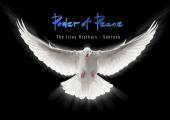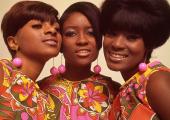In media coverage of Woodstock, Santana always seems to be overshadowed by the oft-mentioned cultural significance of Hendrix’s “Star-Spangled Banner”. However, go check their performances, side by side, for pure visceral thrills, and it’s Santana’s amped Latin explosion that comes up trumps. If he hadn’t spent the better part of the Seventies and Eighties turning out tedious jazz-fusion (as Hendrix might well have done, had he lived), Santana would be on many more 21st century posters and T-shirts.
1999’s collaborative Supernatural album famously rehabilitated him as a commercial entity and last year’s Santana IV, his fieriest effort in aeons, showed there’s still petrol in the tank. However, Power of Peace sounds like it was more fun to make than it is to listen to. Carlos Santana and his percussive powerhouse of a wife, Cindy Blackman, join Ronnie and Ernie Isley and their spouses, Kandy and Tracey (who sing backing vocals) for a church-scented family jam. They cover a range of classic soul, the predominant style an uninspired, often insipid wander in the footsteps of Marvin Gaye’s early Seventies output (“Mercy Mercy Me (The Ecology)” is even covered).
The Isley Brothers are themselves no slouches in the guitar department, and even once had a young Hendrix in their band, but things seldom catch alight, despite much fret-wrangling. The opening tracks get things off to a decent start. A version of “Are You Ready”, originally by psychedelic Sixties soul dudes The Chambers’ Brothers, bodes well, working up a groove, even if a rap section for Stevie Wonder’s “Higher Ground” doesn’t bear close inspection (“Crossing the River Jordan/Like spending time with Michael Jordan”). Unfortunately, after the passable opening trio, things slump into a bland string of slowies, including the only original song, “I Remember”.
There are other passable moments, such as a feisty take on Muddy Waters’ “I Just Want to Make Love to You”, and an impeccable pure jazz version of Leon Thomas’s “Let the Rain Fall on Me” – the album’s best number – but Power of Peace is certainly not going to end up among the essential back catalogue of any of those involved.
Overleaf: listen to The Isley Brothers & Santana "Are You Ready"










